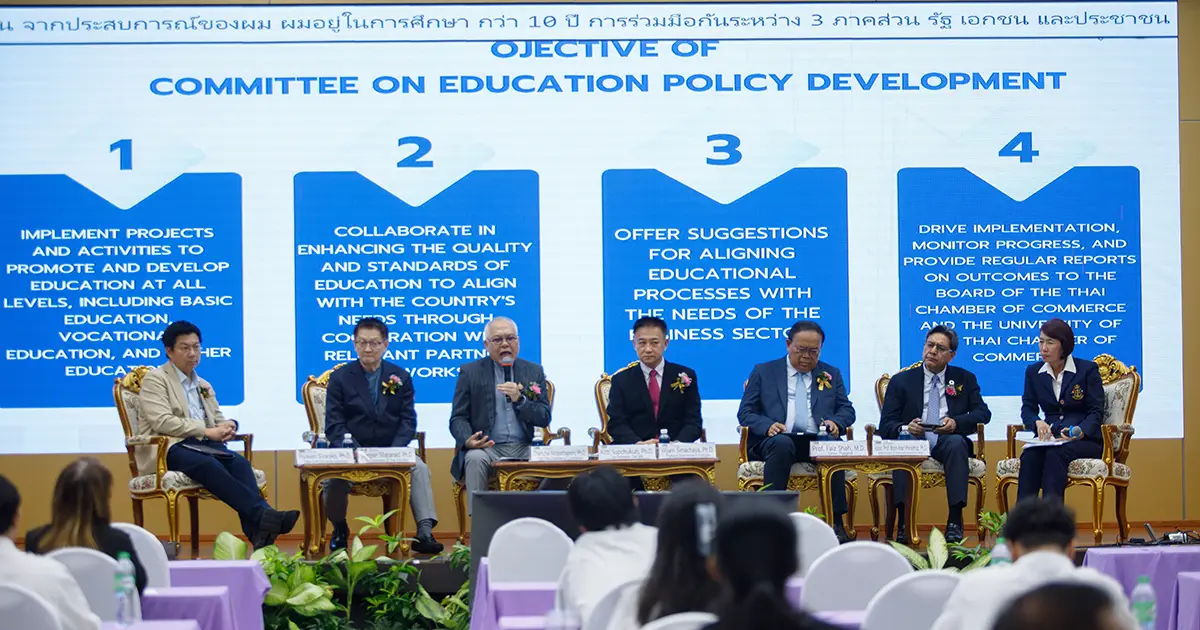by
Piyawat Sivaraks, Ph.D. Office of the Civil Service Commission
Sampan Silapanad, Ph.D. The Federation of Thai Industries
Chartchai Norasettaporn, Ph.D. The Thai Chamber of Commerce
Kitti Supchukun, Ph.D. The Federation Thai SME
Wijarn Simachaya, Ph.D. Thailand Environment Institute
Prof. Faiz Shah, M.D. Yunus Thailand
Panel Chair: Assoc. Prof. Boon-Anan Phinaitrup, Ph.D.NIDA
Summary of panel discussion highlights by
Asst. Prof. Thitat Chavisschinda, Ph.D.
As part of the NIC-NIDA International Conference 2025, the second special panel discussion addressed the pressing need for inclusive growth in the intelligent age. Under the subtheme “Social Innovation and Cross-Sector Collaboration for Inclusive Growth,” the session brought together leading voices from government, industry, civil society, and academia. Moderated by Assoc. Prof. Boon-Anan Phinaitrup, Ph.D. (NIDA), the panel featured Dr. Piyawat Sivaraks (Office of the Civil Service Commission), Dr. Sampan Silapanad (The Federation of Thai Industries), Dr. Chartchai Norasettaporn (The Thai Chamber of Commerce), Dr. Kitti Supchukun (The Federation of Thai SMEs), Dr. Wijarn Simachaya (Thailand Environment Institute), and Prof. Faiz Shah (Yunus Thailand). The discussion centered on how Thailand—and the broader global community—can harness social innovation and cross-sector collaboration to build inclusive, resilient, and sustainable societies.
Panelist Insights: Advancing Inclusive Growth through Innovation and Collaboration
The panel discussion brought together a diverse group of experts whose insights converged on the need for systemic transformation to achieve inclusive growth in the intelligent age. Each speaker contributed a distinct perspective rooted in their institutional experience, collectively forming a multidimensional understanding of the challenges and opportunities ahead.
Dr. Piyawat Sivaraks of the Office of the Civil Service Commission underscored the necessity of a paradigm shift in public administration. He argued that civil servants must transition from traditional roles as rule enforcers to dynamic facilitators of innovation. This transformation, he suggested, requires the adoption of agile governance models that emphasize responsiveness, experimentation, and active citizen engagement. By moving away from procedural compliance and toward performance frameworks that measure social impact, government agencies can foster a culture of adaptive learning and collaborative problem-solving—essential traits for navigating complex societal challenges.
From the industrial sector, Dr. Sampan Silapanad of the Federation of Thai Industries addressed the dual pressures of digital transformation and workforce displacement. He emphasized that industries must proactively invest in upskilling and reskilling to prevent technological exclusion and ensure that the benefits of innovation are broadly shared. Dr. Silapanad called for stronger institutional linkages between academia and industry, advocating for co-created solutions that are not only technologically advanced but also socially inclusive. His remarks highlighted the importance of ethical leadership and long-term strategic planning in shaping an industrial landscape that supports inclusive development.
Dr. Chartchai Norasettaporn of the Thai Chamber of Commerce introduced the concept of “collaborative entrepreneurship” as a mechanism for inclusive economic participation. He proposed the establishment of regional innovation hubs and public-private co-investment models to support community-based ventures. For inclusive growth to be realized, he argued, access must extend beyond financial capital to include mentorship, networks, and institutional support. His emphasis on ecosystem-building and participatory development positioned entrepreneurship as a powerful tool for social empowerment and local capacity-building.
Representing the Federation of Thai SMEs, Dr. Kitti Supchukun focused on the structural constraints faced by small and medium enterprises in the digital economy. Despite their critical role in Thailand’s economic fabric, SMEs often lack the infrastructure and resources necessary to innovate. Dr. Supchukun advocated for targeted support mechanisms, including innovation vouchers, digital literacy programs, and inclusive procurement policies. These interventions, he suggested, would enable SMEs to become active contributors to inclusive growth and agents of social transformation.
Dr. Wijarn Simachaya of the Thailand Environment Institute brought an environmental perspective to the discussion, emphasizing the intrinsic link between ecological sustainability and social equity. He argued that environmental degradation disproportionately affects marginalized populations, and therefore, inclusive growth must be grounded in environmental justice. Dr. Simachaya called for integrated policy frameworks that align climate action with poverty alleviation and community resilience. His vision included cross-sectoral coordination and inclusive environmental governance as foundational elements of sustainable development.
Finally, Prof. Faiz Shah of the Yunus Thailand offered a global and grassroots-oriented lens on social innovation. Drawing from his extensive experience in community development and impact investing, he challenged conventional growth paradigms and advocated for models that prioritize human dignity, ecological balance, and social cohesion. Prof. Shah emphasized the importance of recognizing youth and marginalized communities as co-creators of innovation rather than passive beneficiaries. His call for a bottom-up reorientation of development strategies reinforced the need for inclusive participation and locally driven solutions.
Thematic Synthesis
The panel discussion illuminated several cross-cutting themes that are essential to advancing inclusive growth in the intelligent age. Foremost among these was the imperative for systemic innovation. Panelists emphasized that social innovation must extend beyond isolated pilot projects and fragmented initiatives to transform foundational systems such as education, finance, governance, and infrastructure. This transformation requires a holistic approach that reconfigures institutional logic and operational norms to prioritize equity, adaptability, and long-term impact.
Equally critical was the emphasis on cross-sector collaboration. The panel underscored that effective partnerships must be grounded in shared purpose, mutual accountability, and transparent governance mechanisms. Collaboration should not be episodic or transactional; rather, it must be institutionalized through enduring frameworks that facilitate joint problem-solving and resource alignment across public, private, and civil society actors.
The discussion also challenged conventional metrics of development, advocating for inclusive indicators that reflect multidimensional well-being. Success, the panelists argued, should be measured not solely by GDP or productivity, but by resilience, social capital, and the lived experiences of communities. This shift in evaluative criteria is necessary to capture the full spectrum of human development and societal progress.
A recurring theme was the empowerment of marginalized groups. Inclusive growth must begin with those most often excluded—youth, women, rural populations, and informal workers. Their participation must be active, sustained, and structurally supported. The panel called for mechanisms that elevate these voices in decision-making processes and ensure equitable access to opportunities and resources.
Finally, the panel highlighted the need for policy coherence and flexibility. Governments must adopt adaptive policy frameworks that support experimentation, cross-ministerial coordination, and long-term visioning. Such policies should be responsive to emerging challenges while remaining anchored in principles of inclusivity and sustainability.
Strategic Implications
Building on these thematic insights, the panel articulated several strategic implications for policymakers, institutional leaders, and development practitioners. First, institutional reform emerged as a foundational priority. Public sector institutions must evolve to support innovation through flexible mandates, impact-oriented evaluation, and citizen-centered design. This requires a shift in organizational culture and capacity toward agility and responsiveness.
Second, the development of innovation infrastructure was identified as a critical enabler of inclusive growth. Investments in digital infrastructure, human capital development, and inclusive financing mechanisms are essential to democratize innovation and reduce structural barriers. Such infrastructure must be accessible, interoperable, and designed with equity in mind.
Third, the panel advocated for participatory governance as a cornerstone of inclusive development. Mechanisms for citizen engagement and co-creation should be embedded in policy design and implementation, ensuring legitimacy, responsiveness, and social ownership. This participatory ethos strengthens democratic institutions and enhances the relevance of public interventions.
Fourth, environmental integration was emphasized as a strategic necessity. Sustainability strategies must incorporate social equity and prioritize vulnerable communities, aligning environmental goals with inclusive development. This calls for integrated planning that bridges climate action, poverty alleviation, and community resilience.
Lastly, the panel recognized the pivotal role of academic institutions in knowledge mobilization. Institutions like NIDA serve as conveners, knowledge producers, and translators of research into practice. Their capacity to generate evidence, foster dialogue, and support policy innovation is indispensable to advancing inclusive growth in complex and dynamic contexts.
Together, these strategic directions offer a roadmap for systemic transformation—one that is grounded in collaboration, equity, and innovation. The panel’s insights reaffirm the importance of deliberate, coordinated action to build societies that are not only intelligent but also just, resilient, and inclusive.
Conclusion
Inclusive growth in the intelligent age is not a passive outcome—it is a deliberate, strategic pursuit. The panel underscored that social innovation and cross-sector collaboration are essential to building societies that are not only technologically advanced but also equitable, resilient, and just. As Thailand navigates its development trajectory, the insights from this panel offer a roadmap for systemic transformation rooted in shared values and collective action.
The NIC-NIDA Conference continues to serve as a vital platform for shaping this future—one where innovation serves humanity, and growth uplifts all.




